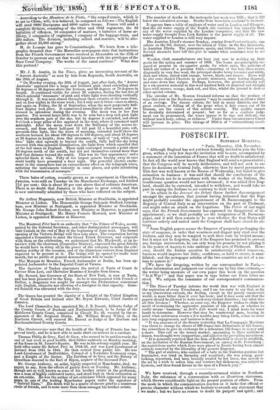POSTSCRIPT.
SATURDAY MORNING.
"Paris, Thursday, 17th November.
"Although England has not yet been formally invited to join the Con- gress, within a very few days the invitation will be sent, accompanied by a statement of the intentions of France that will no doubt be satisfactory. In fact all the world now knows that England will sends representative ; that the Congress will be merely deliberative, and will not seek to en- force its decisions on Central Italy, otherwise than by moral persuasions. This fact was well known at the Bourse of 'Wednesday, but failed to give animation to business : it was said that should the conclusions of the great Powers not be in accordance with the wishes of the Italians, the troublesome question would not have advanced ; it was added that Eng- land, should she be outvoted, intended to withdraw, and would take no part in urging the Italians to act contrary to their wishes. " An article in the Journal des Ddbats threw further discouragement amongst the speculators, that journal having intimated that the Pope might probably consider the appointment of M. Buoncompagni to the Regency of Central Italy as an intervention on the part of Piedmont, and might order an attack on the Legations. The Patric of last night says, that the French Government has expressed its disapproval of the appointment ; so we shall probably see the resignation of M. Buoncom- pagni, and it will then remain to be seen whether the four States will continue orderly and united until the Congress shall have closed its sit- tings. Some English papers accuse the Emperor of purposely prolonging the state of suspense, in order that weariness and disgust may steal over the Italians, and they may be tempted to seek their ends by violent means ; but it must not be forgotten, that if the Emperor has promised to prevent any foreign intervention, he can only keep his promise by not placing it in the power of Austria to take umbrage at the acts of Piedmont. How- ever, should the Italian question be satisfactorily settled tomorrow, business would improve but little; confidence, so hard to create, is anni- hilated; and the newspaper articles of the two countries are not of a na- ture In restore it."
[We have the foregoing, written by our correspondent in Paris,— whose information and judgment our readers can by this time estimate,'— the writer being unaware of our own paper this week on the question "Is it War ? " and that paper was in type before our Paris letter ar- rived. We subjoin the remainder of our correspondent's communica- tion.]
" The Times of Tuesday informs the world that war with England is the aspiration of every Frenchman ; and I am too sorry to say that, as far as my observation extends, the feeling, except in the purely commercial world, is more bitter than it ever has been and it does seem odd that the papers should be allowed to write such very violent diatribes ; but what does all this betoken ? Whether, as some say, the Emperor wishes to claim the merit of restraining the aggressive passions of his people, or whether he really means business,' as Bell's -Life would say, I must leave for wiser heads to determine. However that may be, commercial men, bearing in mind what unforeseen events a few months may bring forth, refuse to enter into long engagements, and business is dead. "It was announced at the Bourse yesterday. that La Compagnie Maritime was about to change its shares of 3043 franca into Debentures of 425 francs ; the subscribers to give in exchange for a debenture 125 francs in money and a share. This call on the money market, amounting to three millions of francs' was thought very inopportune, and added to the prevailing uneasiness. " It is generally reported that the firm of Rothschild is about to establish, on the invitation of the Magian Government, an agency at St. Petersburg ; the restrictions under which Jews were placed in Russia having been almost entirely removed by the liberality of the present Emperor.
"The girl of sixteen,•who carried off a baby in the Tuileries gardens last
September, was tried on Saturday and acquitted ; she was young, good- loolcing, repentant, had been brutally treated by her lover, was moved to the act by a wish to soften him and retrieve her dishonour, was subject to hysteria, and thus found favour in the eyes of a French jury."


























 Previous page
Previous page